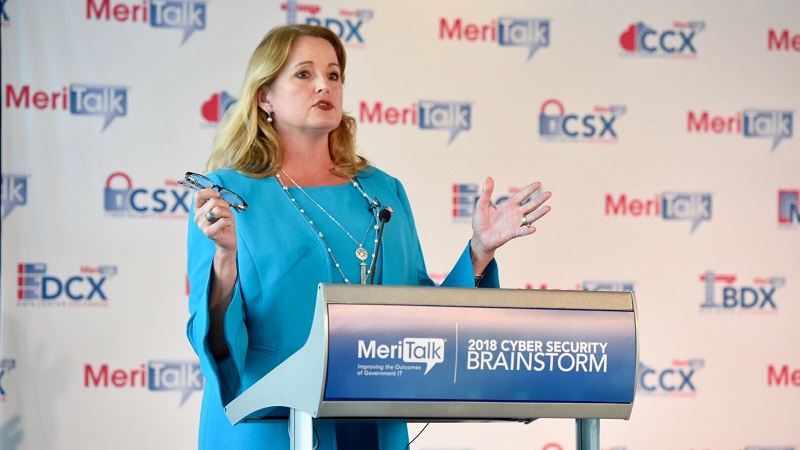
Federal CIO Suzette Kent said today that the advancement of artificial intelligence technologies is of primary importance to the Federal government, as agencies begin to determine their AI priorities and a picture of government-wide investment begins to form.
“AI is a priority of this entire administration, our lawmakers, and our Federal leaders,” Kent said today at a conference hosted by NVIDIA. “This is a topic of national importance.”
“Particularly from the DoD, our intelligence communities, and civilian agencies, they’re all thinking about this and publishing what their priorities are,” she said.
Asked about the question of Federal government funding, compared to the vast sums that other nations have committed to AI research and development, Kent said that agency priorities are informing the larger picture from a dollars and cents perspective. And she said that the administration is “working on a publicly-shareable number” as it pertains to funding.
But that work isn’t restricted to agencies, Kent noted. She called attention to a report on AI released by Reps. Will Hurd, R-Texas, and Robin Kelly, D-Ill., the leading figures on the House Oversight and Reform’s IT subcommittee.
The white paper, released on September 25, advocates for increased Federal engagement with AI, and offers recommendations in the areas of workforce, privacy, biases, and potential malicious use of the technology.
Kent linked the use of AI to the priorities of the President’s Management Agenda (PMA) and its expressed goal to leverage data as a strategic asset. The right data sets are what will train next-generation systems, and that “fuel” is key to success in the field, Kent said.
“If you don’t make the right investments on the data side, it’s like you have the fastest plane in the world and no fuel,” she said, adding that “it’s difficult getting it right.”
“Getting the data equation right actually puts us in a place where we can deliver the outcomes that the country deserves, and we can leverage some of the advanced compute technologies for years to come.”
She added that the focus of the PMA’s data goal will be to use Federal data to “grow the economy, and increase government effectiveness and transparency.”
And so Kent took a moment to reflect on some of the inner workings on AI within the Federal government. She shared some of the main takeaways of a White House AI summit held in May, in addition to the news out of the summit of the creation of a Select Committee on AI.
Four Federal actions emerged, Kent said–prioritizing funding on AI R&D, removing barriers to innovation, emphasizing the workforce, and fostering global partnership.
Industry groups expressed concern in July that the White House summit didn’t go far enough and failed to address “many critical issues.” The groups advocated for a public process to provide comment on AI issues.
The administration has perhaps heard those concerns, as Kent today affirmed that the Federal government is looking for multiple ways to engage the public on how to best advance new technologies.
“I have one overarching message as well. I’m here because we also want feedback. When I talk about policies, use cases, and areas where we are evolving our thinking and the maturity of how we use AI across Federal agencies, we intend to continue engagement,” she said.
Kent noted that today was the last day to provide comment on the newly-released draft of the Cloud Smart strategy and also indicated that the Federal Data Strategy–open to comment as of last week–would be another avenue for stakeholders to provide feedback to the government.
“We want to hear feedback and we want to ensure we’re moving aggressively and quickly in the right direction,” she said.
Rifling through a list of examples in which AI is already beginning to impact the Federal government, Kent sought to make it clear to industry partners that the time to get involved and provide impact to government missions has arrived. “We are not waiting, and now is the time to seize this opportunity,” she said.
